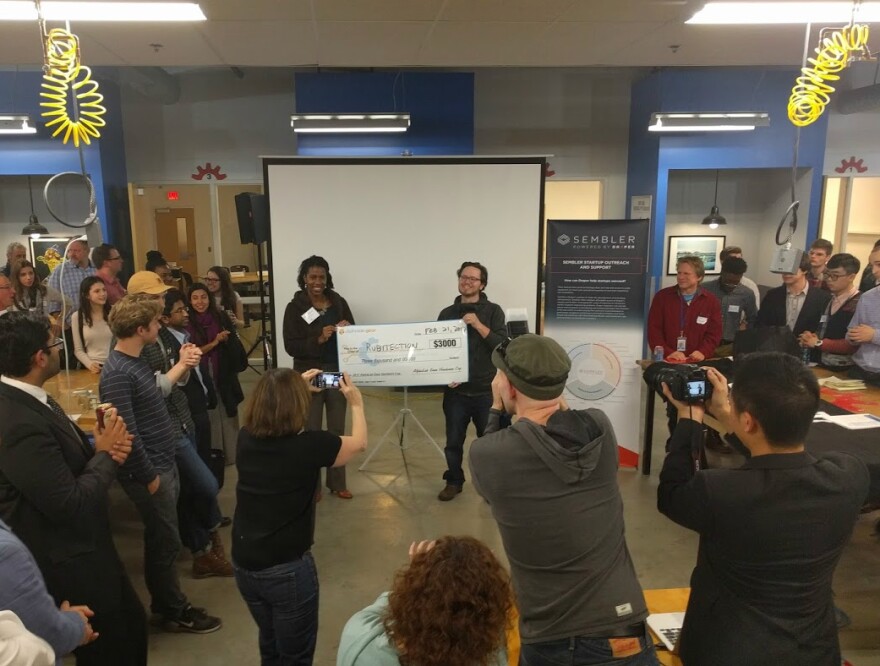A handheld device that can detect bedsores is one of the designs aiming for a $50,000 grand prize at AlphaLab Gear’s Hardware Cup next month.
The device was designed by a team named Rubitection, which beat out six other groups and took home a $3,000 prize at the Mid-Atlantic regional qualifier last month.
The start-up incubator, located in East Liberty, is hosting the innovation contest for its third year.
Other designs included a robotic material-sorting waste bin and an assistive video-game controller for people in wheelchairs.
As participants showed off their designs at TechShop, an open-access workshop in Bakery Square, onlookers scribbled in notepads and a table of judges took in four-minute pitches from participating teams.
“It’s a great way to get feedback from a broad audience about my business idea,” said Tino Go, founder of Dimensionally Yours, a custom furniture company. “The questions and insights that come up in Q and A sessions and conversations after the fact are very valuable to help me hone my idea and business model.”
Tech accelerators like StartUptown, Hustle Den and Innovation Works, which houses AlphaLab and AlphaLab Gear, are an important step of entry for upstart businesses. Recently, the restaurant waitlist app NoWait, developed at AlphaLab, was purchased by Yelp.

Pittsburgh’s tech startup re-invention has brought about a wave of excitement. While the city is home to Uber’s autonomous car testing and a Google campus, a study by the Kaufmann Foundation ranked Pittsburgh 40th out of the top 40 metropolitan areas for startup business. Though, Pittsburgh trails cities like San Jose, Chicago and Los Angeles, it ranks fairly high in venture capital investment.
And Pittsburgh has a leg up in hardware innovation. Robotics.org counts Pittsburgh as one of three main robotics clusters in the U.S., and said that its ecosystem contains more roboticists than MIT and Stanford combined.
AlphaLab's Hardware Cup contest plays to Pittsburgh's manufacturing past. It wasn’t about apps or algorithms, but physical products. It's something Ilana Diamond, managing director at AlphaLab Gear, said is “more traditionally Pittsburgh."
Innovation is great, Diamond said, but someone needs to build and carry out those ideas. That’s why southwestern Pennsylvania is ideal, she said, because of its tech industries and production facilities.
“In Pittsburgh, we really know how to make things,” Diamond said. “Within an hour or an hour-and-a-half of Pittsburgh, there are literally thousands of manufacturers who can help these startup companies get started and manufacture in small batches.”
Jeffrey McDaniel, a Hardware Cup judge and executive-in-residence at Innovation Works, said Pittsburgh provides the right mix of social support and tech resources for start-ups.
“It’s a very supportive ecosystem," McDaniel said. "When these startups need help in a variety of different segments, they don’t have to go very far.”
Speed is also a precious commodity, said Afshan Khan, program manager at Innovation Works. She said that startups often fail because they worry about perfection before production. Getting feedback early in the process, and from a variety of voices, she said, is crucial. The Hardware Cup, which also held regional competitions in Los Angeles, Boston, Ft. Lauderdale, Washington D.C., Chicago and Austin, is meant to put that idea in action.
Ray Abel of Xogo, a company which develops video game controls for people in wheelchairs, said he’s brought his product to competitions and conferences in about 45 cities so far.
“Whether we win or lose, it’s still worth it to go out and make these connections," he said. "As a start-up we need to talk to as many people as possible."












